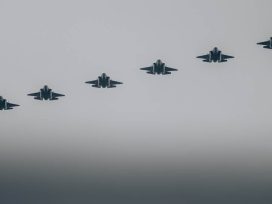Like any re-run, the gas conflict between Russia and Ukraine was boring – even for those lucky Europeans with diversified gas supplies who did not suffer much from gas shortages. For many Ukrainians and probably Russians, however, the dispute resembled a quarrel in a Soviet-era komunalka – a shabby apartment block where a number of families shared a common kitchen, bath, and other facilities. Like a divorced wife, Ukraine had no other apartment to go to, while Russia, like an abandoned husband, did everything possible to punish her for her perceived betrayal.
Below the surface, however, the post-Soviet soap opera is more complex. It is certainly not only about gas – as one may have gathered, given Putin’s conception of Russia as an “energy super-power” and his explicit intention to use energy as “a lever of economic and political influence in the world”. Nor is it a conflict only between Russia and Ukraine – as one may have also have gathered, observing Russia’s growing “assertiveness” in both the near and not-so-near abroad – from, say, the poisoning of Alexander Litvinenko in the UK to the large-scale military invasion of Georgia.
When the annexation of Georgian territories, a triumph of sheer force, met with virtually no international sanctions, further escalation of Russian “assertiveness” in the post-Soviet komunalka was rather predictable. Speculations abound about whether Ukraine would be next. Many observers expected that the primary target would be the Crimea – the only Ukrainian region with a Russian ethnic majority, Russian military bases, and a noticeable grass-roots secessionist movement. Only very few commentators argued that Russia is not interested in the Crimea but in the whole of Ukraine. The takeover of the Crimea might be feasible but not rational – not because of the rather improbable event of international sanctions, or even because of more probable troubles with the Ukrainian and especially the Tatar minority in the Crimea. No, irrational because the Crimea is first and foremost an important leverage of Russian influence in Ukraine – a function it would hardly be able to fulfil were it detached from Ukraine and attached to Russia. Put simply, for the Kremlin strategists the Crimea is like a screw in the body of Ukraine that can be twisted at any time to send the proper signals to Kyiv, Nato, or Russian allies and agents within Ukraine.
After Georgia, Ukraine certainly had to be next. But the “special operation” would have to be completely different. In Georgia, there are virtually no pro-Russian forces, so the goal of the operation was not an overthrow of the central government but rather an annexation of territories. More important still, the invasion was meant to intimidate other neighbours, Nato rivals, and, not least, investors interested in transporting Caspian gas and oil via Georgia, bypassing Russia.
In Ukraine the situation is different. Many Russians, including Putin himself, seem to believe that half Ukraine’s population are ethnic Russians (the real figure is 17 per cent). And, of course, all they can do is dream about “re-unification” with Mother Russia. So, the Kremlin has little interest in the annexation of any Ukrainian territories (plan B), so long as these are instrumental in the eventual “Belarusization” of the entire Ukraine (plan A). Not coincidentally, both the 2009 and the 2006 gas wars were launched in election years in Ukraine (presidential and parliamentary), perceived by the Kremlin as crucial in terms of possible (and desirable) power turnover and “anti-Orange” revenge.
So unsurprisingly, the gas war with Ukraine differed substantially from the military operation in Georgia – both in terms of the means and ultimate ends. In both cases, however, one could note interesting similarities. First, the careful and well-disguised preparation of the assaults, which included various diplomatic and logistical manoeuvres – the concentration of military resources against Georgia, and the monopolization of energy resources, specifically from Central Asia, against Ukraine. Second, the gradual escalation of the conflict, fuelled by militant propaganda in Russia and promoted by “pro-Russian” pawns and provocateurs in Georgia and Ukraine. Third, the coordinated international efforts of Russian diplomacy, intelligence, and well-paid PR-companies to defend the “true cause” and to discredit the “enemy”. Finally, the well laid traps for both the Georgian and Ukrainian leaders. In Georgia, Russia’s job was made easier by the predictable reactions of Micheil Saakashvili; in Ukraine, by the predictable mistrust and infighting between the president and the prime minister, in addition to the opportunism of a political opposition ready to assist the Kremlin in any way against the “Orange” foes.
Alas, in the new gas war, exactly like in last year’s war in Georgia, one cannot blame Russia only. Ukraine has demonstrated its typical ambiguity, which, in this case, comes most likely from three major sources. First, the inconsistency and political weakness of Yushchenko himself. Second, the deep divisions within the Ukrainian elite, including clashes of interest between competing business lobby groups. Third, the murky legacy inherited by the energy trade from the previous regime. The very fact that neither Ukraine nor Russia, either in the latest conflict or in 2006, presented the international court with contracts and other documents for impartial arbitration says a lot about the character of this business.
The main reason why, until 2005, Russia sold gas to Ukraine, and Ukraine transported it westwards at a symbolical price, was certainly not any kind of “friendship” or “altruism” on either side. It was a very beneficial cooperation between a handful of Ukrainian and Russian officials and oligarchs who know much better than anybody else how much cheap gas was sold to and consumed in Ukraine and how much of it was resold to the West. Such a scheme could obviously not have functioned without the blessing from the top. The notorious RosUkrEnergo company, among others, was created on the personal political say so of Putin and Kuchma. Not by chance, it was Yushchenko’s and especially Tymoshenko’s attempts to eliminate a dubious Gazprom-connected intermediary, RUE, from the gas trade that infuriated the Kremlin and caused the first “gas crisis” early in 2006. One may recollect that, five years earlier, a similar attempt by Tymoshenko to interfere with the holy cow of gas and oil trade cost her a vice prime-ministerial position in Kuchma’s cabinet and even short-term imprisonment under dubious charges. In September 2005, Tymoshenko was fired again – this time by Yushchenko. Yet a few months later the president proved either professionally incompetent or politically impotent to complete a much needed clean-up of the energy sector – despite the Kremlin’s pressure and blackmail. The cancer of large-scale corruption was not eliminated three years ago and now it has returned with dreadful metastases.
The compromise signed on 19 January by the Ukrainian and Russian prime ministers evokes mixed feelings. On one hand, it looks like a step in the right direction. The agreement introduces a European pricing formula and establishes fairly clear price adjustment mechanisms. Also, importantly, it eliminates an opaque intermediary in the gas trade, likely to have been a major concession by Gazprom to European “pestering”. Also, as some commentators have remarked, it looks like a joint punishment by Putin and Tymoshenko of Dmytro Fiedrtash, a Ukrainian co-owner of the RUE, who reportedly became too friendly with Mr Yushchenko.
On the other hand, the contract itself is deemed a “commercial secret” and some important details remain unknown. This raises concerns, once again, about the respectability of the deal. Especially worrying is a decision to grant up to 25 per cent of the Ukrainian domestic gas market to Gazprom’s subsidiary Gazpromsbyt-Ukraine. The move presumably facilitates Gazprom’s double book keeping, whereby gas is re-exported to Europe, which would seem to be the main reason of Gazprom’s “commercial confidentiality” for years. Also, argue commentators, the state-owned (or Kremlin-owned) company can provide political support to Russian businesses and Russia-friendly oligarchs in Ukraine.
The Russian-Ukrainian part of the European gas trade has been, for years, non-transparent, corrupt and therefore vulnerable. There was a good opportunity to fix the problem after the Orange revolution in 2005, but the Ukrainian leaders had neither skill nor will nor unity to do so. And certainly, Russia, or rather Gazprom-cum-Kremlin, had even less intention of giving up a powerful political tool and source of personal enrichment. The recent agreement signed by Putin and Tymoshenko may have eased the tension, but it will hardly bring a viable long-term solution. On one hand, it runs against the political and (personal) economic interests of the Russian elite. On the other hand, Ukraine’s capacity to withstand the political and economic pressure is just too low, while the temptations of various under-the-table offers are just too strong.
Regretfully, the EU is reluctant to play the role of strong and impartial arbiter, and to help Ukrainians, at least those of them who would like to introduce transparency, legality and predictability to heavily criminalized and manipulated energy trade. So far, a desperate lack of unity and solidarity in the EU, and dramatic short-sightedness and parochialism, if not overt cynicism, have contributed to European instability nearly as much as unchecked Russian “assertiveness” and infantile Ukrainian ambiguity. It makes Russia a much stronger player in terms of resources and than it should be, in view of the policies it pursues and the values it promotes both domestically and internationally. One need not necessarily have spent all one’s life in a komunalka to understand a simple truth. Even the largest group of people can be helpless faced with a mediocre bully as long as they are disunited.






